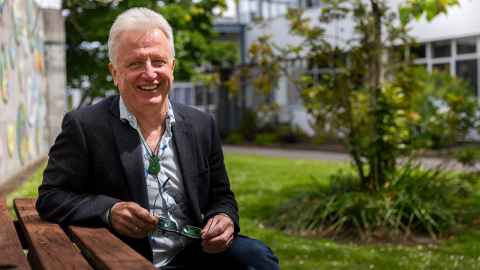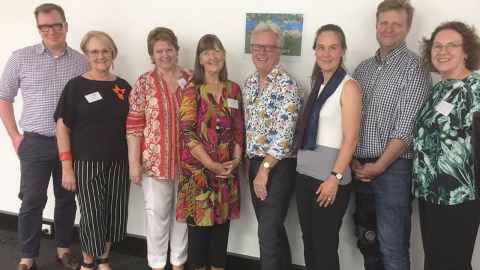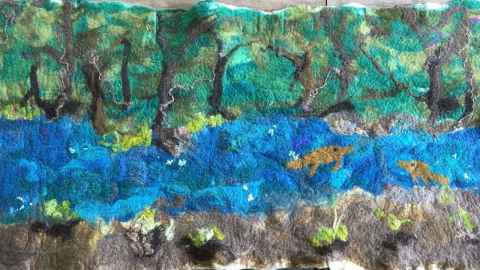Creative toolbox helps teachers and children after Australian bush fires
11 February 2020
University of Auckland professors lead a trans-Tasman collaboration providing tools for teachers to guide children following the Australian bush fire disaster.

When Australian school teachers stepped into the classroom on the first day of the school year, they knew it needed to be a safe haven from the horror of the bush fires that had devastated so many communities in New South Wales and Victoria.
Before the school term started, many teachers had gathered in Sydney to hear the expertise of University of Auckland arts educator Professor Peter O’Connor and colleague Professor Carol Mutch, who is also the UNESCO Education Commissioner for New Zealand.
Professor O’Connor was approached in January by Australian academic colleagues to lead a project to help teachers when students returned to school during the ongoing bushfire crisis. He has previously worked with children in Christchurch following the earthquakes and terror attacks, and in Mexico City following earthquakes there.
What resulted was a one-day gathering of 30 academic experts from arts, health, education and disaster recovery, from the Universities of Melbourne, Sydney, Central Queensland, NSW, Tasmania and South Australia on 24 January.
“First I talked to Professor Carol Mutch here, then to colleagues at the universities of Melbourne and Sydney, along with my friend who’s the president of the National Alliance of Arts Educators in Australia,” he says.
“Within 24 hours we had a core team of half a dozen professors and artists, another colleague who runs the Arts Health Network in NSW, and we were away. We often talk about the importance of networking ... within two days we had the best people in this area in this part of the world, on the team.”
The experts produced a set of resources and advice for teachers and posted it onto the New South Wales Arts Health network site. Teachers in schools across NSW were directed to it for support as they returned to schools.
“Universities are slow beasts, but we had academics who were really fast. Because for this to be at all meaningful, it had to be up and out for the first day back at school. And we did it,” he says.
Schools have a role in helping children understand the world in which they live. You can't go back to school in Australia now and pretend this hasn't happened.

As well as practical classroom activities teachers could do with children at all levels, the web content included what was needed for the first and subsequent weeks.
“We named the initiative after the banksia flower that can regenerate after a crisis. We saw it as a metaphor for our work: the wonder of the arts to strengthen communities in the midst of disaster. It reminds us that natural regeneration is possible.
“Schools have a role in helping children understand the world in which they live,” he says. “You can't go back to school in Australia now and pretend this hasn't happened.”
Professor O’Connor says some children have been evacuated five or six times, or have lost their homes or seen neighbours lose their homes and members of the community die.
“There will be first-year teachers who've had no training in their initial teacher education, no resources, who end up with 30 five-year-olds thinking ‘what the hell do I do’?
“A lot of our thinking was around how we support them. If you’re the adult with these children, they’ll have a huge range of questions. You can’t put that off by saying ‘Oh we're just doing what we'd planned’.”
The Banksia Initiative met in Sydney, with a practical arts-based workshop on the second day for around 50 teachers. A webinar for those who couldn’t attend the event was watched by around 200 people around Australia.
“I did the work I've done both in Christchurch and Mexico City after earthquakes and showed how you can do that with little ones. [Professor] Helen Cahill from the University of Melbourne covered how you could work with secondary school students.
“In Australia, after the Black Saturday bushfires in 2009, their Ministry of Education, and a whole range of other organisations, have been really proactive in developing tools for schools.”
However, he says, the same isn’t true of New Zealand.
“Even though we’ve had the Christchurch earthquakes and a terror attack, in New Zealand we don’t have anything like this in place for schools. There's the usual excellent advice about returning to normal. But how do you deal with the stories coming in? How do you work in ways which are productive and safe and acknowledge what's been happening in young people’s lives? In New Zealand we've actually fallen way behind.
“Often in disasters, schools become the hubs by which everything operates so it’s really important that you structure what you do on the first days back. For example, how you memorialise is a really big question. If you lose a couple of kids in your school to a disaster, how do you manage that?”
He says the same applies in the workplace.
“If someone’s family member dies, do you just walk past them at work as if nothing happened? What are you telling kids if you do that?”
Sometimes you feel as an education academic that you might be removed from the everyday world of those you study, but this experience has highlighted that what we do is important and can make a difference to people's lives.
Professor Mutch has worked in five countries in post-disaster situations and agrees that students need school to be a place of safety, security and calm after the chaos in their lives.
“They need familiarity and routines. They also need safe ways to begin to make sense of the events – speakers at the seminar gave ideas for using the arts, literature and drama as vehicles for emotional processing.”
Professor O’Connor says anger and fear were dominant emotions felt by the teachers attending the workshop.
“It was hugely powerful. I started the first workshop by just providing a space for people to talk about what's been happening. There’s a real anger that this has happened, and there’s this whole climate change issue that their government refuses to acknowledge as well as anger over the way their government handled the crisis. So there was this huge outpouring of emotion.”
He says the teachers talked openly in ways he’d never heard in classrooms.
“They just wanted to talk about how scared they are. I mean this whole fire business and, you know, black sky, and choking on dust and smoke.
“We also talked about how important it is for when teachers go back to school, to talk about it as a staff too. They need to sort that out before they start working with kids and there's lots of research around why that's important.”
“Everyone reacts differently to disaster and it’s important to look after yourself and those around you,” Professor Mutch adds. “Teachers and principals tend to put their students, families and communities before their own needs and can become exhausted very quickly.”
Professor O’Connor says tertiary institutions training teachers also need to think about how to ensure their graduates are equipped to deal with such crises.
“Here in Education and Social Work after the terror attack, there was some info put up online. But we didn't sit and talk to each other. So we’ve got all these beginning teachers who are wondering what they are going to do with their kids.
“There were also lots of teacher educators who, after those two days in Sydney, said, ‘I need to go back to my university and say ‘when these events happen, we need the opportunity for staff to think about what it means for us, but also what it means for our students and our class in the coming days’.”

Professor Mutch says there are common messages for teachers and principals and the talk she gave at the gathering provided some key messages, a summary of which is on the Banksia Initiative website.
She says since the seminar she has been contacted personally by teachers, to share stories or ask questions.
“This has highlighted the need for teachers, especially beginning teachers or teachers in remote locations, to be able to talk to someone in person about their concerns.”
She says the advice sheets she prepared for Australian teachers have attracted global interest.
“A teacher in Puerto Rico asked if she can translate them into Spanish and share with schools in her country as they return after their recent earthquakes. Sometimes you feel as an education academic that you might be removed from the everyday world of those you study, but this experience has highlighted that what we do is important and can make a difference to people's lives.”
Professor O’Connor says the need to talk following a disaster is vital.
“I think of the dislocation after the Christchurch terror attack in 2019,” he says. “We basically just went on as we were, in terms of what we did for teacher education in classrooms, as if nothing had happened.
“Not talking about it is about the worst thing you can do because it makes schools less than human.”
Media contact
Julianne Evans | Media adviser
Mob: 027 562 5868
Email: julianne.evans@auckland.ac.nz